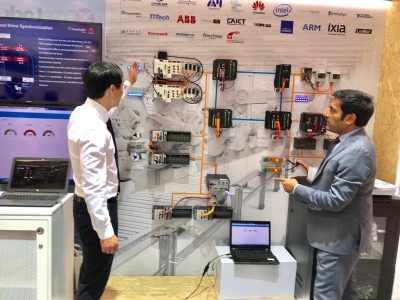Smart Manufacturing Initiative Announced at Hannover Messe 2018

At Hannover Messe 2018, more than 20 international organizations and leading industry vendors jointly announced the "Time-Sensitive Networking (TSN) + OPC Unified Architecture (OPC UA)" smart manufacturing testbed covering six major industrial Internet scenarios. The stakeholders engaged in the testbed include the Alliance of Industrial Internet (AII), Avnu Alliance, Edge Computing Consortium (ECC), Fraunhofer FOKUS, Huawei, Schneider Electric, HollySys, National Instruments Corporation (NI), B&R Automation, TTTech, and Spirent Communications. Huawei's TSN switches provide highly reliable and ultra-low-latency industrial control network for the testbed. At the event, the testbed was demonstrated by simulating a range of real-life smart manufacturing conditions to show its key technical highlight -- TSN + OPC UA, which is the major driving force for new technologies such as predictive maintenance, data analytics, machine learning, and artificial intelligence (AI). TSN + OPC UA helps industrial companies enhance efficiency by reducing downtime, improving overall device efficiency, and reducing total cost of ownership (TCO).
Smart manufacturing requires flexible production systems and cross-platform, cross-industry applications, however this demands large-scale real-time industrial communications networks which present significant challenges for operators.
Launched at the Hannover, the testbed complies with the OPC UA standards, ensuring that multiple devices from different vendors can easily collaborate with each other in a single system. The TSN testbed integrates Software-Defined Networking (SDN) technology to prioritize traffic based on precise timing and transmit both real-time and non-real-time data over a single network. This enables connectivity and interoperability for machines, people, and things across the entire network and bridges the last mile for the industrial Internet.
Huawei and several other pioneers have established the smart manufacturing testbed for six industrial Internet scenarios: TSN for Predictive Maintenance (by Huawei and AII), Motor Synchronization (by Huawei and NI), Racing-Car Game (by Huawei and HollySys), Plotter Motion Control (by Huawei and Linmot), LED synchronization (by Huawei and Schneider Electric), and OPC UA over TSN (by Huawei and B&R Automation). This testbed verifies the highly deterministic and low-latency nature of the TSN network in complex environments, and ensures strict synchronous motion control in industrial scenarios. Spirent Communication's test devices were used to generate TSN and non-TSN traffic, to prove the benefits brought by new industrial network architecture and services.
"Since the introduction of Programmable Logic Controllers (PLCs) in the 1970s, industrial automation processes have been optimized significantly," stated Dr. Alexander Willner from Fraunhofer FOKUS. "The convergence of these operational technologies and modern information and communication technologies will fuel interesting and exciting innovations across the whole value chain. With OPC UA and TSN, we have two promising building blocks towards interoperable real-time information exchange in industrial domains. The scenarios demonstrated in our joint testbed showcase our respective technological advancements as we look to the future of digital networking."
"In the future, tens of billions of devices will be connected to the Internet in the industrial sector. The traditional industrial Ethernet is unable to manage the huge volumes of data generated by these devices, and therefore a new architecture is required to deliver large bandwidth, high speed, and support for multiple protocols to enable massive connectivity," said Dr. Jesse Luo , European solution and product management and marketing director of Huawei. "In the future, Huawei will help build an industrial Internet ecosystem by deepening cooperation with more organizations and vendors in the industry. These moves are part of Huawei's ongoing efforts to continuously optimize TSN technology and standards, achieve network-wide connectivity and interoperability enabled by the TSN network, and accelerate digital transformation of the entire industry."
Huawei works with global partners to develop more efficient and smarter innovative digital industrial solutions for customers, making it possible to build new operational processes and infrastructural platforms for Industry 4.0. The solutions have helped more than 1,000 manufacturing companies worldwide enhance their production efficiency.





